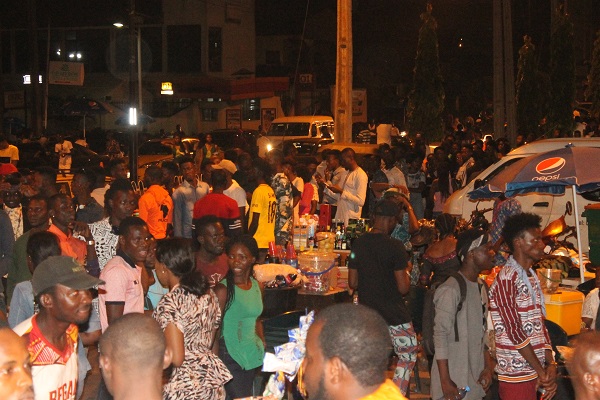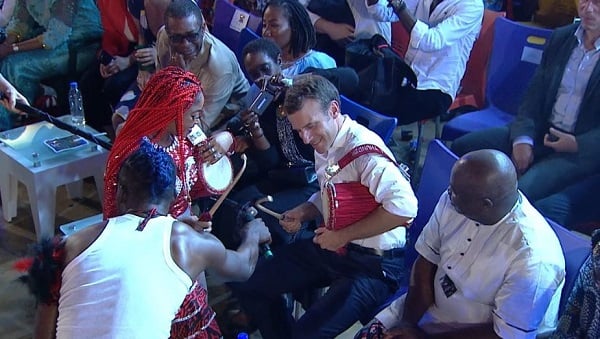Over three months ago, at a table standing just a few feet away from the wall sign warning against drug use at the New Afrika Shrine, was where a waiter had, under the pretext of looking for change, made away with my money and left me to nurse a lukewarm bottle of beer. It was a Thursday and I was alone, waiting for Femi Kuti and his band to come on stage, to awaken the spirit of us; his congregants returning from work, deadened by the incessant Lagos hustle.
This is Lagos and I have fallen mugu. At the time, I had found the incident amusing, even developed a level of respect for the waiter for outsmarting me and my naivety. We all know – don’t we? – that change must be collected first before payment is made. Doesn’t matter if it is a beef roll seller running after your car on Third Mainland Bridge or at a bar in Ikeja.
On a typical day at the Shrine, smoke wafts through the air and the tangy smell of marijuana hangs on clothes. It’s a haze here. But it is, most importantly, a happy place. There’s a sense of equality in the Shrine, like a community, but without social class stratification. Everyone leaves their ego at the door and come in to chill, forget their worries.
Think of the Shrine as a recreational park, but instead of benches and grasses, you have ugly chairs and tables and beat-up speakers spilling music. Somehow it is relaxing. It’s without pretension. Nowhere else is like the Shrine in Lagos.

Outside the shrine, when the sun goes to sleep, small kiosk and stands are set up, selling anything from lighter to cooked noodles. It is capitalism on a small scale; everything, including chairs, is monetised. Outside and inside the Shrine, marijuana is not a street corner business. Sellers, basically, hawk it and call out to patrons. It is perplexing and paradoxical, considering that the Shrine stands neck close to state government offices.
But all these disappeared and the Shrine was reborn last Tuesday when President Macron of France visited Lagos and the birthplace of Afrobeat was taken over. People, like the waiter and your favorite weed seller, whose daily hustle and lives are connected to the Shrine, were expelled for the evening. They stand by a barricade across the street, waiting and hoping to catch a glimpse of the hundreds of Lagos finest who had converged to welcome President Macron.

It took me a few tries to spot him, but if you look to the right in the direction of the Art X exhibition, you’d spot Nobel laureate, Wole Soyinka, and his mesmerising head of white hair. I wondered what he thought of the whole setup, was he amused by this whole charade and did he, like me, find Macron’s comment on colonialism troubling? Somewhere between the opening speeches and Yemi Alade’s performance, Soyinka disappeared – as did Genevieve Nnaji, who had literally stood behind me all evening. Soyinka, like the rest of us, had arrived on time and waited well over three hours for Macron to arrive.
President Macron is a real charmer. And everyone soon forgets – and forgives – how long we’ve waited for him. He breaks security protocol, stopping the show while at it, to climb the highest point at the Shrine and wave down on us. Obama style, but with two hands. The crowd goes crazy. Whistles and claps. Camera flashes and quick videos. Lagos is in love with Macron.
Sleeves rolled up, smile selfie-ready, Macron has brought his roadshow to Nigeria as a way of extending France’s soft power to Africa, to deepen cultural ties as a way of boosting diplomatic and economic relations. And to be fair, Macron was something of a rock star that night with the way he worked the crowd, took down questions like a champ and eagerly assisted in Nollywood’s mock filmmaking. Lagos, Nigeria’s culture nerve center, loved Macron – not just for the power and influence he embodied but for his personality too.

Macron was right when he said that what happens in the Shrine stays in the Shrine. I have come to the Shrine in the past and my mother must never hear the full details of it. But tonight, as I walk out of these doors, I ponder on the idea of rootlessness and existing without a past.
In the early 1960s, legendary American Jazz musician, Nina Simone, and several other blacks in diaspora had arrived a post-independence Lagos eager to build ties with the motherland and learn more about their root and identity as descendants of black Africans. But the thing is: even we in Africa are far removed from our past and, in most cases, unaware of our histories and origins.
Nigeria’s cultural heritage has been bastardised by colonialism and what was left of this culture was rendered desolate and illegitimate by neo-colonialism.
President Macron, while fielding questions at the Shrine, says Africa should ‘move on’ from colonialism. Macron was right when he pointed out that young Africans today had no direct experience of colonialism. Still, he forgets quite conveniently that till date the effect of colonialism is rife and a lot of issues faced in Africa presently have their roots in colonialism: gender inequality, political instability, minority persecution, tribalism.
The Shrine is the home of Afrobeat, a spiritual touchstone of sorts for followers of Fela, his brand of activism music and legacy, now embodied by his sons, Femi and Seun Kuti. Through his music, Fela had raged against colonialism, western hegemony and corrupt leaders. France’s neocolonialism, particularly, looms large in Africa and corruption is still a malignant thing in Lagos, and Nigeria as a whole. If Fela were alive today, would he have feted the representatives of what he preached against?
In protecting his father’s legacy, Femi Kuti (who runs the Shrine alongside his sister, Yeni Kuti) also bears the task of protecting his own – after all, he is undisputedly an exceptional musician in his own right. This fact was emphasised in my interview with him at the Shrine last March.
Femi Kuti is different from his father, less aggressive and much more realistic and diplomatic. And to be fair, one can never tell what Fela (whose life and messages has become entertainment for the bourgeoisie and the people he railed against) would have thought of the whole event.
It is past midnight and Femi Kuti just closed out his rousing performance at the New Afrika Shrine. This is Lagos, a popular event has ended and we all know that pictures must be taken for the ‘gram, accompanied by self-serving captions that overestimate ones’ role in the narrative. A proof that we belong. Outside the Shrine is a scene out of a Hollywood action-movie playbook: a combination of French and Nigeria security are on the ready, waiting to sweep into action. A Caucasian security woman is shouting orders, asking drivers to be on the ready. The event is over, soon Macron and his entourage will be on the move.
Across the street, standing under the yellow glow of the streetlight, are the Shrine’s – temporarily – expelled citizens. Tomorrow they will return to their hustle as if today didn’t happen. The Shrine goes back to what it was before — just how we like it.
Emeka Nwankwo is a culture writer and PR executive at Cassava Republic
Copyright 2025 TheCable. All rights reserved. This material, and other digital content on this website, may not be reproduced, published, broadcast, rewritten or redistributed in whole or in part without prior express written permission from TheCable.
Follow us on twitter @Thecablestyle

